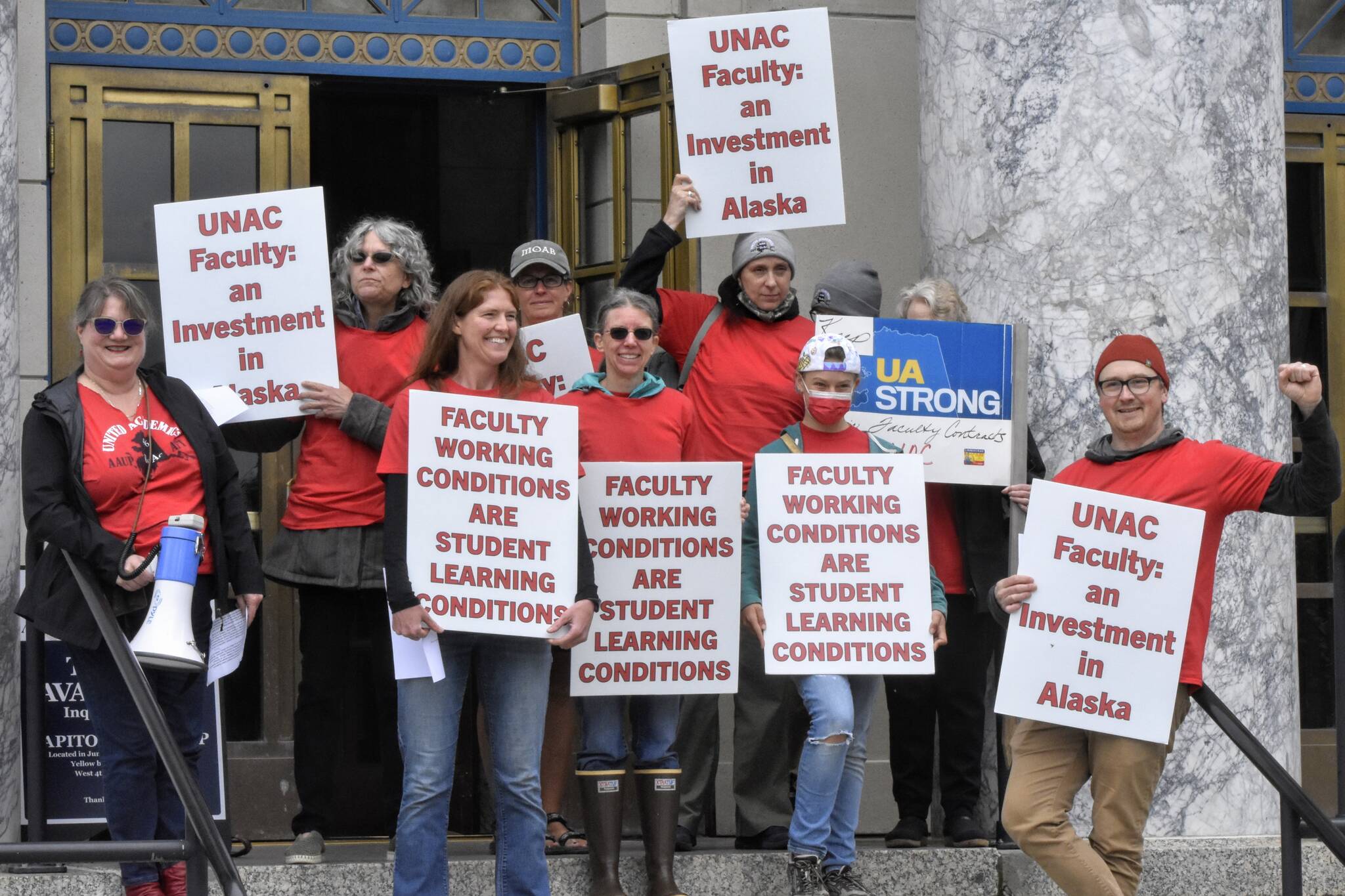This article has been updated to correct the schedule of wage increases proposed by the University of Alaska.
With negotiations scheduled for Thursday, United Academics – American Association of University Professors/American Federation of Teachers Local 4996 members stood on the steps of the Alaska State Capitol and called on the University of Alaska leadership to pass a negotiated contract.
“While our members have worked tirelessly in extraordinary conditions we have received a single 1% raise in six years,” said Jill Dumesnil, a professor of mathematics at the University of Alaska Southeast and one of the union’s negotiators, “resulting in an approximate 20% decrease in purchasing power.”
Speaking to about a dozen union members and a handful of supporters in front of the Capitol, Dumesmil said faculty are not a cost driver for the university, but an investment in the future of Alaska.
“Our members have dedicated their lives and careers to educating future generations of Alaskans,” Dumesnil said. “We deserve a fair and competitive negotiated contract.”
The two parties have been under federal mediation since April when the University put forward its last best offer which included pay increases of 3%, 2.5% and 2% over three years starting in Fiscal Year 2023. Union members are asking for annual increases of 3% or the current consumer price index, up to 5% for the 2023 academic year and 7% in 2024, and 6% in 2025 whichever is higher, and additional annual lump sums of $1,000 added to base salary each academic year.
The union’s contract was meant to be renegotiated in 2019, but the university system faced severe cuts under Gov. Mike Dunleavy’s budget and was forced to cut $70 million from its budget over three years. But those cuts came just before the COVID-19 pandemic, which further eroded the university’s finances.
In May, university officials sent the proposed wage increases of 3%, 2.5% and 2% over three years to the Alaska State Legislature for approval in the Fiscal Year 2023 budget, citing an impasse in negotiations with the union. But the union disagreed that an impasse had been established, and UNAC’s lead negotiator Tony Rickard called the university’s decision, “questionable and even disingenuous.”
[Gross ends campaign in odd election’s latest twist]
On Wednesday, Dumesnil wouldn’t say if she believed the next day’s negotiations would be fruitful.
“They are participating in mediation with us, currently,” Dumesnil said. “Since federal mediation is confidential, I have to say we’re currently in mediation.”
According to Dumesnil, there’s not a set timeline for when an agreement must be reached and that as long as parties are negotiating and making progress the process will continue, but members were hoping for a new contract before the start of the academic year in August. There are certain conditions under state law where the union could legally hold a vote for a strike, Dumesnil said, “but we are certainly not there as long as we are in negotiation.”
On the steps of the Capitol, members cycled through their own variations on familiar protest chants including, “Hey, hey! Ho, ho! LBO has got to go” in reference to the university’s last best offer.
Leading many of the chants was faculty librarian Jonas Lamb, who told the Empire he loved working at UAS.
“I’ve been working in the library and in the classroom teaching freshmen (composition) all through the pandemic and it’s starting to feel like the university doesn’t love me back,” Lamb said. “Six years with a 1% raise, it’s getting tough to live in Juneau.”
Lamb and other members said spending was a matter of priority, and the university is spending money on new facilities and salaries for administrators.
“I do understand that a lot of those are three positions that have been piled into one,” Lamb said of administrative positions, “but faculty are also bearing a lot of that extra workload and not seeing a subsequent pay increase.”
In an email, UA spokesperson Monique Musick said the university declared an impasse following eight months of negotiation which ended in a deadlock when the union declined UA’s last best offer.
“The university declared impasse because negotiations were not resulting in meaningful movement on significant issues. That is the legal definition of labor impasse,” Musick said. “When negotiations are not progressing and reach impasse, the parties have the right to take other steps to resolve labor disputes, such as strikes, lockouts, and implementation of a ‘Best and Final Offer.’”
The university had its budget reduced by more than $100 million since the 2014 Fiscal Year, Musick said, and UA has been unable to invest appropriately in any area of the university, including faculty.
“UA can only agree to terms that can be supported by the Board of Regents and the Department of Administration, be funded with a Legislative appropriation, and that will avoid a gubernatorial veto. A package that is too rich might not get appropriated, or worse, might get appropriated without additional funds to pay for the increases,” Musick said.
Both Dumesnil and Musick said it was in the best interest of students, faculty and the university to reach an agreement soon.
• Contact reporter Peter Segall at psegall@juneauempire.com. Follow him on Twitter at @SegallJnuEmpire.

